ARTICLE AD BOX

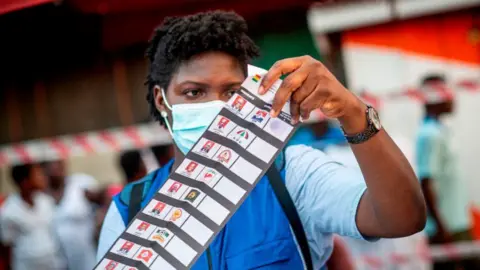 AFP
AFP
Ghana is due to get a new president after December’s election. The current vice-president, Mahamudu Bawumia, and a former head of state, John Mahama, are the two leading candidates in contention to win the poll.
Nana Akufo-Addo, first elected in 2016, is coming to the end of his second and final four-year term.
When is the general election?
On Saturday 7 December, the nearly 18.8 million Ghanaians registered to vote will be able to take part in the country's ninth general election since multiparty politics was reintroduced in the early 1990s.
In the last 30 years, the country has had a series of closely fought but peaceful polls. Ghana has a reputation for the orderly transfer of power between administrations.
What are Ghanaians voting for?
On polling day, two elections will be taking place simultaneously:
- Presidential – there are 12 candidates
- Parliamentary – voters in 275 constituencies across the country will be choosing their MP.
Who will be Ghana’s next president?

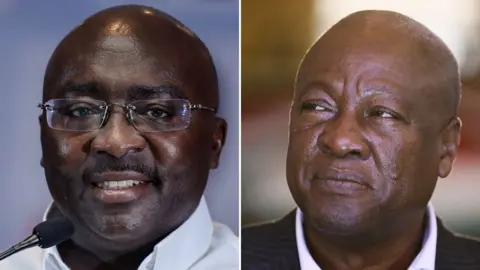 AFP
AFP
Mahamudu Bawumia (L) and John Mahama (R) are the two leading candidates to replace Nana Akufo-Addo as president
Although 12 hopefuls are vying for the presidency, only two have a realistic chance of winning. Since the return of multiparty politics in 1992 only candidates from either the National Democratic Congress (NDC) or the New Patriotic Party (NPP) have won.
The two front-runners are:
- Mahamudu Bawumia (NPP) - Having served as Akufo-Addo’s vice-president for eight years, the 61-year-old Oxford-educated economist could make history as the country's first Muslim president. The former deputy governor of the central bank gained a reputation for his financial know-how. But that could also be his undoing as he has faced heavy criticism after Ghana plummeted into its most severe economic crisis in years under his watch.
- John Mahama (NDC) – Winning this ballot would represent a comeback for the 65-year-old as he already served as president for four-and-a-half years from 2012 but then lost the 2016 election. In office, he was nicknamed “Mr Dumsor”, which is a reference to the power cuts that plagued his time in office. Amid the current tough economy, Mahama has pledged an “urgent reset” for the country that needs an experienced leader at the helm.
Among other candidates garnering attention are:
- Nana Kwame Bediako – The businessman, also known as “Cheddar”, does not have a political background but has made a lot of impact on social media and attracted young supporters.
- Alan Kyerematen – The former minister, nicknamed “Alan Cash”, left the NPP last year after complaining that the presidential primaries were biased against him. He could draw some NPP support in the party’s heartland in the Ashanti region.
What are the big issues?
Economic questions have topped people’s concerns in the build-up to the election, especially the rising cost of living. At the end of 2022, the annual inflation rate hit 54%. It has come down since then but prices are still rising steeply.
The World Bank said as many as 850,000 Ghanaians may have been pushed into poverty in 2022 because of the rising prices of goods and services. These "new poor" joined the six million who were already living in poverty.
By the end of 2022, government finances had been depleted with little left to support the country’s budget, forcing Ghana to go to the International Monetary Fund for help.
Unemployment among young people and an exodus of Ghanaians looking for better opportunities elsewhere has also been a feature of recent years.
The NDC has decried this as an "abysmal performance" and has demanded a reset.
The governing NPP says it has built a resilient economy that is on the "cusp of… transformation" so it is not the time to change.
Concerns over the environmental impact of illegal gold mining – known in the country as “galamsey” – have become another major talking-point. A series of demonstrations over the practice, which has led to the pollution of several major rivers with dangerous chemicals, have been held in the build-up to the vote.
Both major parties agree that the issue needs to be addressed, but while the NPP says it is important for the economy to allow some small-scale miners to continue their work, the NDC is calling for much tougher regulation and the restriction of new licences.
How does the election work?

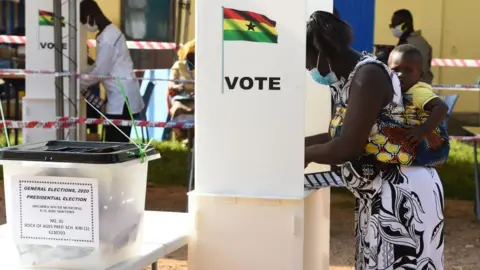 AFP
AFP
The last election in 2020 took place under covid restrictions
To win the presidential election in the first round, a candidate must get more than half of the votes cast. If no-one passes that threshold then a second round run-off featuring the two candidates with the largest number of votes will take place by the end of December.
The parliamentary election is run on a first-past-the-post basis with the winner being the candidate in each constituency with the largest share of votes, even if that is less than 50%.
On election day, each voter can turn up to their assigned polling station with their voter’s ID card, where they will have their fingerprints electronically checked and are then issued with the two ballot papers. Each person who has cast their ballot then has their little finger marked with indelible ink to prevent voting a second time.
What has happened in previous elections?
Since 1992, Ghana has had several tight presidential elections.
In 2008, less than half a percentage point separated the two candidates in the second round.
In the election four years later, the winner, Mahama, crept over the 50% threshold in the first round by less than 80,000 votes.
That result triggered a legal complaint from the NPP, which argued that tally sheets at certain polling stations had been tampered with. The challenge was unsuccessful, but it did lead the electoral commission to introduce new measures to ensure greater transparency.
Election observers have frequently praised the way the vote has been run.
When will we know the result?
Going by previous elections, the electoral commission is likely to announce the result by 10 December.
Additional reporting by Favour Nunoo and Komla Adom in Accra


More BBC stories on Ghana:



 Getty Images/BBC
Getty Images/BBC

 2 months ago
12
2 months ago
12
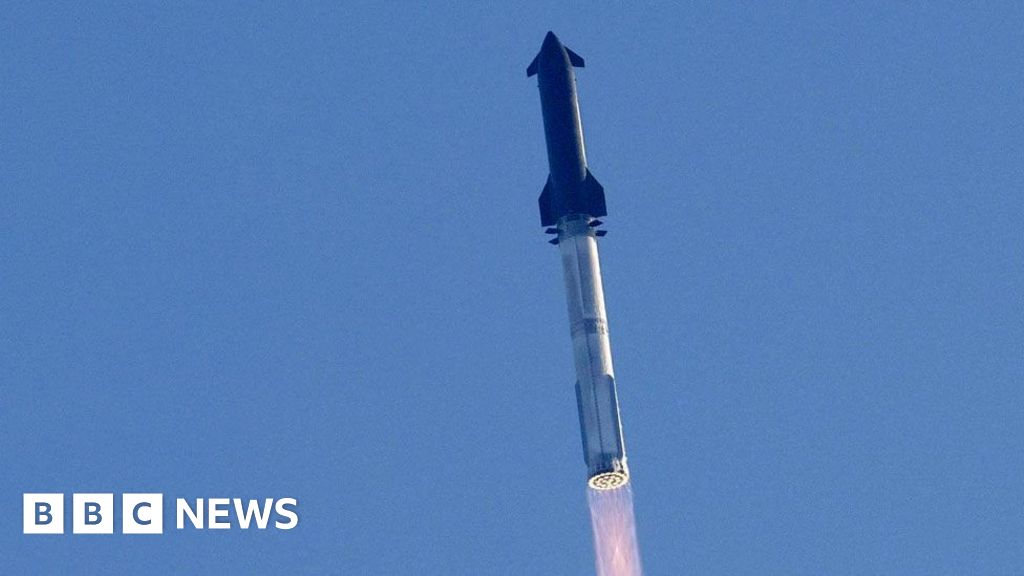
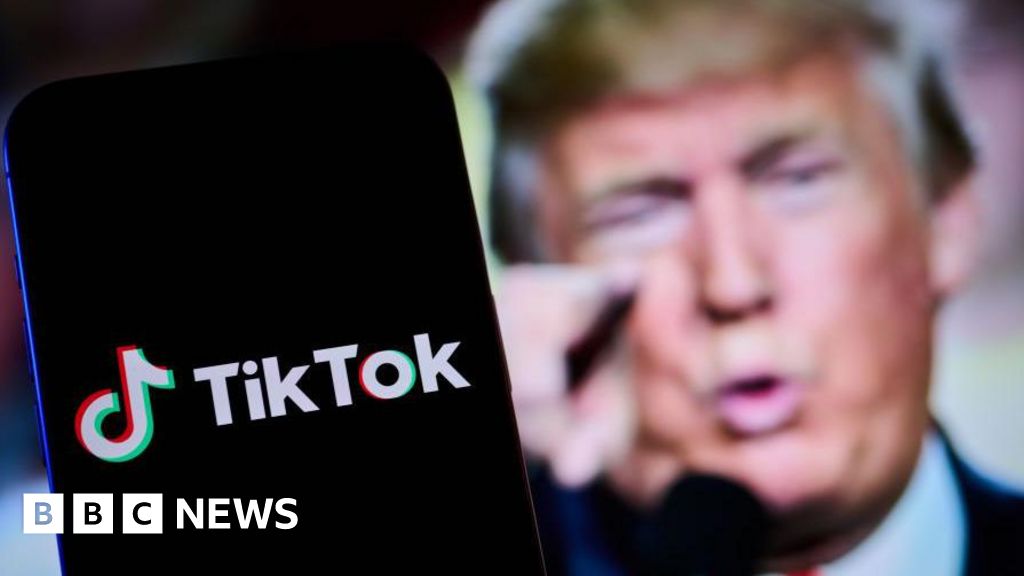
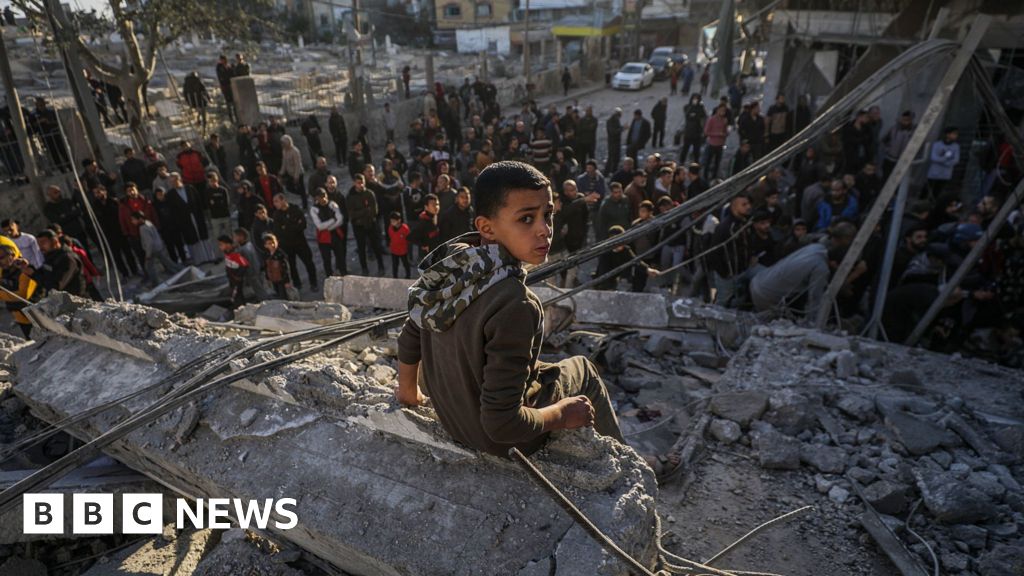





 English (US) ·
English (US) ·